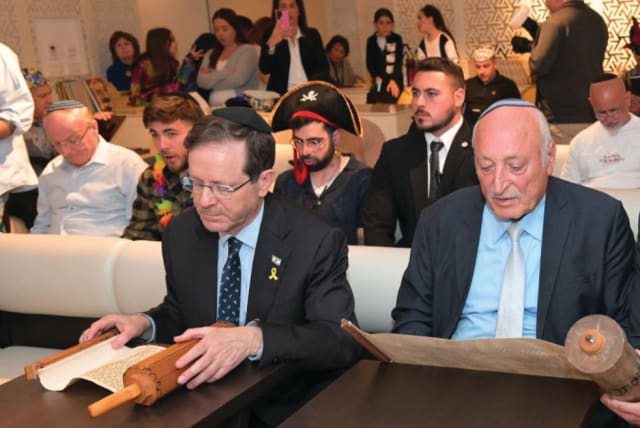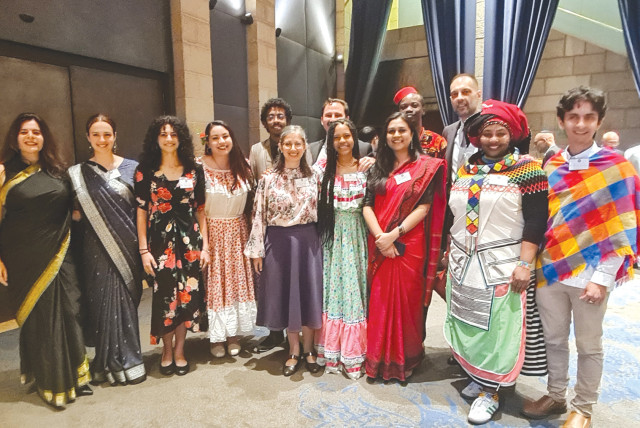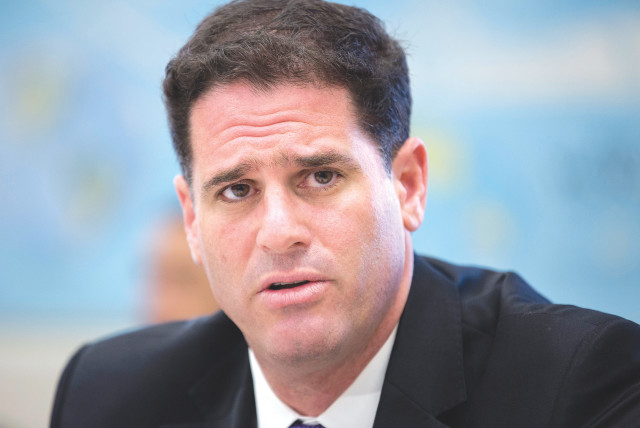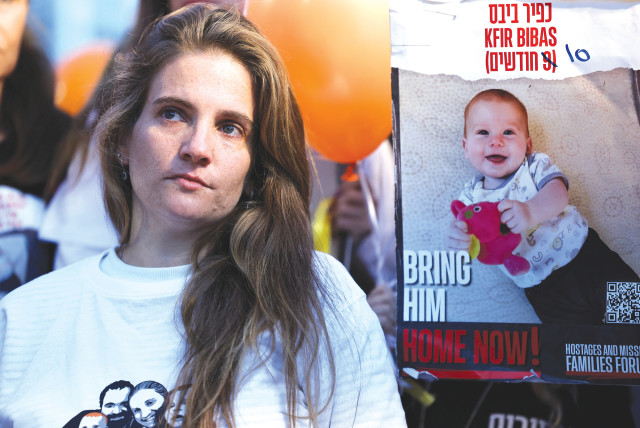Grapevine March 27, 2024: When the nose knows

Movers and shakers in Israeli society.
Matching Purim characters to the Knesset
Former Shas MK Yigal Guetta, who is now a radio and television broadcaster, was bantering before Purim about what identities members of Knesset should take, and came up with a beloved character of fiction – Pinocchio, the key figure in an Italian children’s novel written close to two centuries ago. Pinocchio’s nose grew longer every time he told a lie.
Israeli newspaper cartoonists apparently came up with a similar idea. For some years now, they have been depicting Prime Minister Benjamin Netanyahu with an abnormally long nose. In actual fact, the prime minister’s nose is not unusual in size, but he does have a tendency to arrogate to himself declarations and deeds, the credit for which belongs to others.
Surprising Purim traditions
Not everyone is aware that there is more than one Purim and even more than two or three. Prior to the reading of the Scroll of Esther, or the Megillah as it’s generally known, at the Yad Vashem synagogue in Jerusalem, two senior staff from Yad Vashem’s guiding department, Naama Galil and Yochai Copenhagen, presented an intriguing lesson on the history of Purim, how it is celebrated and commemorated in different countries and the special delicacies that are eaten.
The reading of the scroll was done by Prof. Jonathan Halevy, the president of Shaare Zedek Medical Center, whose style and perfect enunciation make him a much in demand Torah reader at various Jerusalem synagogues.
The Yad Vashem synagogue, designed by prizewinning, internationally acclaimed, Israeli-born architect Moshe Safdie, is in itself a mini museum, showcasing sacred items that are remnants of European synagogues destroyed during the Holocaust. The synagogue serves as an archive of memory to the once-flourishing Jewish communities of Europe. It is also a place for personal prayers in memory of relatives who were murdered or who perished in the ghettos and the camps.
The synagogue has superb acoustics – something that is not always taken into account in designs of buildings for public use.
In the Balkans, according to the two Yad Vashem representatives, every time the Jewish community was saved from a massacre through some apparent miracle, another Purim was declared.
The special cookies that are eaten on Purim, known as hamentashen, were originally called mohntashen – poppy-seed pockets; and in countries where Ladino is spoken rather than Yiddish or Hebrew, the recipes are somewhat different, and so are the names.
There are four essential Purim commandments: to read or attend a reading of the Megillah; to be joyful while simultaneously remembering attempts by despots to eliminate the Jews from the face of the earth; to exchange gifts of food; and to provide for the poor.
Most of the people who attended the Purim service at the Yad Vashem synagogue were child Holocaust survivors, and quite a few came dressed in the Purim spirit.
The evening concluded with a merry klezmer recital by Omri Rivlin and Vladimir Czeczlinski.
On display, in front of the ark, was a centuries-old Scroll of Esther discovered and rescued from the Krakow Ghetto in March 1943.
Legend has it that there was also a Queen Esther in Krakow, though there is no absolute proof. However, there is a street named after her in the old Jewish Quarter of Krakow. According to the story, she was exceedingly beautiful and caught the eye of King Casimir the Great. The main clue to any truth in the story is that Jews suffered great persecution in 14th-century Poland, and that after Casimir fell in love with Esther, persecution ceased. Esterka, as she was called, is referred to in both Jewish and Polish historical literature.
Herzog delivers Megillah reading
In any given week, President Isaac Herzog travels the length and breadth of the country, but for the Megillah reading on Sunday night, all he had to do was cross the road to the synagogue at the Theatron hotel, which is directly opposite the rear entrance to the President’s Residence. Services are held daily in the beautifully appointed synagogue, and in recent months attendance has been gratifying, as nearly all the guest rooms are occupied by evacuees, most of whom are traditional in their religious observance.
Joining Herzog at the service were evacuees from Kiryat Shmona, Sderot, and Shlomi.
Herzog greeted the congregants, saying that it was very emotional for him to meet them, to strengthen them, and in particular to assure those from the North that he is well aware that they are living through a period of great uncertainty. He offered them encouragement in the knowledge that in the final analysis they would all return home in peace and by the grace of God.
“We all pray and work toward the speedy return of the hostages,” he said, quoting Maimonides. “There is no greater deed than liberating captives.”
He also called for the strengthening of the Israel Defense Forces on land, sea, and in the air. His final appeal was for the preservation of national unity and love of Israel.
The return of Adloyada
There was considerable controversy in Jerusalem this year as to whether to hold an Adloyada parade during wartime. Those in favor said that the somber atmosphere of the nation should not be imposed on children, and that they should be allowed to celebrate and have fun. Those against said it would be a travesty to parade through the streets of the capital in joy, while the hostages kidnapped by Hamas were still languishing in Gaza.
The various arguments prompted Aryeh Halivni, the founder of Toldot Israel, the anthology of Israel’s contemporary history, to release an item about the beginnings of the Adloyada tradition.
For those who may not be aware, it’s customary to drink alcoholic beverages on Purim till one reaches the stage of losing awareness. “Adloyada” is a conglomerate of three Hebrew words literally translated as “till he didn’t know.”
The excerpt from Toldot Israel reads as follows: “In December 1931, the Tel Aviv Municipality held a contest to choose a new name for the annual Purim festival. Suggestions came in from such noted authors as Bialik, Tchernichovsky, and Avraham Shlonsky. The winning entry came from Yitzhak Dov Berkowitz, Sholem Aleichem’s son-in-law, and himself an Israel Prize-winning author.
“‘Adloyada’ is a contraction of ‘ad d’lo yada,’ the Aramaic words in the Talmud that encourage drinking on Purim until one no longer knows the difference between blessed is Mordechai and cursed is Haman. The name stuck, and to this day, Purim celebrations throughout Israel are known as the ‘Adloyada.’”
Purim history
Currently doing the rounds on electronic media is a story about a Purim song. During Purim 1954, Moshe Sharett, who was then prime minister, came to the Milo Club, which was then the cultural center of the Labor Party, and saw that everyone was in a dejected mood.
Five years earlier, Yigal Alon had sent a cable to Israel’s first prime minister, David Ben-Gurion, informing him of the conquest of Eilat.
Following five-year anniversary celebrations, a busload of merrymakers who were returning home, on March 17, 1954, which coincided with the eve of Purim, was attacked by terrorists, plunging the whole country into shock, fear, and grief. Eleven of the passengers were murdered..
The tragedy hung like a cloud over planned festivities. The Purim party at the Milo Club at 16 Zamenhoff Street was anything but cheerful.
In the crowd, Sharett caught sight of songwriters Ya’akov Orland and Mordechai Zeira, who were then the celebrity songwriters of the nation, and whose works are still popular today. Sharett grabbed them by the arms, dragged them into the kitchenette, gave them a bottle of brandy, and demanded that they write a happy song to change the mood. He left them alone, and as he closed the door he told them not to exit until they could come up with a new, happy song.
After a short time, the two emerged with the song written on a paper serviette. They started to perform it for Sharett, who was the product of a musical family. He immediately caught the tune, took a clarinet from the band and accompanied them.
Returning to Israel post-pandemic
Before Covid, New Yorkers Leslie and Fern Penn used to come to Israel at least once every two years. For Leslie it was purely a vacation and a means of boning up on his knowledge of Zionist history and of Israel. For Fern, it was a mix of business and pleasure.
The couple used to be the proprietors of a Made in Israel fashion, accessories and giftware store, and Fern’s forays to Israel were to look at merchandise in the abovementioned categories. She made friends with Israeli designers, and even after she and Leslie gave up their enterprise due to soaring rents in the Big Apple, Fern remained involved with Israel by leading food and fashion tours to Israel.
But then came the pandemic, during which many international airline services were suspended, and any plans the couple had for visiting Israel were put on hold.
They finally returned to Israel last week, after an eight-year hiatus. It was not the Israel they remembered, though their two favorite hotels, the Dan in Tel Aviv and the King David in Jerusalem, still carried the quiet luxury aura of decades past, even though each had undergone subtle renovations.
But streets in both cities had changed. Where once there had been single-story cottages, or three- or four-story apartment buildings, tall towers now dominate the skyline, and new streets have been created in some places.
In New York, Leslie is the executive director of the Conservative Synagogue of Fifth Avenue, of which he was previously the longtime president. Fern prefers the Orthodox synagogue in Riverdale led by Rabbi Avi Weiss, and known as the Hebrew Institute of Riverdale, or the Bayit. But Riverdale is too far from her home to walk, so she goes to the Conservative Synagogue on Fifth Avenue on Shabbat and other Jewish holy days, and to the Avi Weiss synagogue on weekdays, where congregants have made Links of Love crocheted multicolored necklace strands to give to evacuees in Israel.
Fern brought 100 of these necklaces with her to distribute to evacuees in the hotels where she and Leslie stayed. The congregants also made gifts for soldiers and families of hostages.
Jews all over New York want to do something for Israel, said Fern, who is thinking of leading another food and fashion tour, if she can persuade people to shake off their fear of coming to Israel.
Meanwhile, she wants to make contact with the Kadar Foundation which late last year sought to promote awareness of the plight of the Israeli hostages with bouquets of hope made up of yellow flowers. The project, which began in Hostage Square in Tel Aviv, spread to the United States, where proceeds from sales are transferred directly to the families of the hostages. Fern believes that if she and Avraham Kadar put their heads together, they can come up with some more awareness-raising initiatives.
October 7 families speak out
Being famous is no guarantee that members of the government will come to your side in a time of trouble. Soccer commentator Shlomo Scharf, in an interview with Shalom Kital on KAN Reshet Bet radio, mentioned that after his granddaughter was murdered by Hamas on October 7, not a single member of the government came to pay a condolence call.
“It’s a terrible thing when a grandparent has to bury a grandchild,” said the former soccer player, coach of the national team, and the coach who led Maccabi Haifa to three championships.
Meanwhile, he has donated an ambulance to the Haifa Home for Holocaust survivors, to be used free of charge whenever one of the residents requires hospitalization. He is also a regular visitor to the home, assisting its residents with their various needs.
Celebrations with the Baha'i community
Like many other movements, organizations, and institutions, the Baha’i International Community, which last week celebrated its new year and the coming of spring, debated what kind of celebration it should have this year in view of the circumstances, or whether it should have a celebration at all, said David Rutstein the BIC secretary-general.
In the final analysis, it was decided to go ahead, but on a somewhat lower key than usual. This was evident both in the floral decorations and in the musical entertainment.
In past years, mini gardens have been established in the lobby leading to the banquet room at the David Citadel Hotel in Jerusalem, where the BIC always celebrates its new year or Nowruz, as it is called in Persian.
This year, the floral creations were subdued and consisted of two garden patches, each with a large yellow centerpiece to symbolize the hoped-for return of the hostages.
There appeared to be more guests than in years gone by, including Russian Ambassador Anatoly Viktorov, who, socially speaking, has paid the price for his president’s folly. He could not have known of the tragedy that would strike his country the following day.
Following the terrorist attack in a Moscow concert hall, President Herzog called Viktorov to offer his condolences to the families of the dead, and sincere wishes to all the wounded for a speedy recovery.
Herzog condemned in the strongest terms the barbaric terrorist attack perpetrated in Moscow, and emphasized that terrorism of any kind, especially jihadist terrorism, indiscriminately targets all peoples, of all beliefs and religions, while sowing fear and destruction.
Fighting terrorism is a major international challenge, and the countries of the world must fight it together, he said.
Chefs at the David Citadel outdid themselves in presentation and flavor. A piquant mullet was reminiscent of highly spiced chraime, and the poached salmon with a semi sweet sauce was delicious. The colorful fruit platters with a rich assortment of top-quality fruits were a feast to both the eye and the palate. There was also a variety of meat dishes for carnivores, but vegetarians and some of the people who had abstained from eating during the day, during the Fast of Esther, avoided the meat for fear that it might be too difficult to digest after a fast.
BIC deputy secretary-general Ariane Sabet explained that the new year falls at the beginning of spring, which is the season of renewal, the season in which there is less darkness and more light.
Representing the government was Eyal Sisso, the director-general of the Population and Immigration Authority, who was born and raised in Haifa, where he frequently visited the Baha’i Gardens. Commenting on the “strong and important relations between Baha’i and Israel,” he said that he is happy to welcome Baha’i volunteers from around the world to Israel.
Underscoring the difficulty of celebrating while the hostages are still suffering in captivity, Sisso said: “We pray daily for their return.”
Several of the Baha’i volunteers wore the national costumes of their respective countries.
Singing with soldiers
Among Israel's most popular community singers is Einat Sarouf, who in her youth was a great fan of Yaffa Yarkoni, who she says remains her source of inspiration, and she will be playing Yarkoni in a Habima musical during the summer.
Meanwhile, before she figuratively steps into Yarkoni’s shoes, she has been singing to and with the troops and civilians in the same manner as Yarkoni, who died in January 2012.
She has also been traveling to America to raise the morale of Jewish communities and Israeli expatriates. Israelis living in New York and Miami have turned up in droves to her concerts there, and, according to interviews Sarouf has given to the Israeli media, some actually weep over the line in the national anthem declaring that our hope is not yet lost. It’s a line that applies perfectly to the present situation.
Dermer speaks on role
Strategic Affairs Minister Ron Dermer posted on X (formerly Twitter): “When I was Israel’s ambassador to Washington, I must have met more than 160 other ambassadors. I never met the ambassador of Babylon, never met the ambassador of Imperial Rome, and I didn’t meet the ambassador of the 1,000-year Reich. But there is an ambassador of Israel. We will survive this enemy.”
Bibi-bashing indulgences?
Former US ambassador to Israel Martin Indyk, who twice served in that position, appears to be indulging in subtle Bibi-bashing (some might consider it Israel-bashing) via his X account. If he keeps it up, it will only serve to increase support for Netanyahu.
Israelis of all stripes are permitted to indulge in Bibi bashing, but not anyone from abroad, even if that someone happens to be Jewish. It’s something like a parent being permitted to say anything negative about his or her child, but woe betide anyone else who takes the liberty of deriding or chastising that same child. Israelis can say terrible things about Bibi, but will take a tough stand against non-Israelis who dare to do the same.
Packing and sending mishloah manot
It would be a reasonably safe bet to say that more Purim gift packages of pastries, cakes, candies, chocolates, fruit, and wine were delivered in Israel this year than the usual average. Good-hearted Israelis and people from abroad sought to bring cheer to evacuees displaced for indefinite periods from their homes, reservists in the IDF, and soldiers who have been wounded.
When the ANU – Museum of the Jewish People came up with an idea to involve its friends’ organizations in Israel, the US, and elsewhere in an initiative that would cater to all the aforementioned categories, expectations were that sufficient funds would be raised for a few hundred gift parcels. In the final analysis, 2,100 gift packages or mishloah manot, as they’re called in Hebrew, were distributed by museum employees to patients in hospitals from Jerusalem to Beersheba, as well as to displaced persons in hotels around the country.
The initiative was in partnership with Foodish, the culinary unit of the museum, which baked pastries and prepared other food items, and made sure to purchase ingredients from reservists in the food industry.
Foodish CEO Merav Oren said that such enthusiasm had not been anticipated, but she was delighted with this.
Freed Israeli hostage speaks out
Last week at the United Nations Human Rights Council, B’nai B’rith International, the B’nai B’rith World Center-Jerusalem, and B’nai B’rith’s Office of United Nations Affairs facilitated remarks by freed Israeli hostage Aviva Siegel, whose husband, Keith, remains in Hamas captivity in Gaza, and Ofri Bibas, whose multiple family members have remained captive for more than five months. Among them are her brother Yarden, sister-in-law Shiri, and nephews Ariel (four years old) and Kfir, who was eight months old when abducted from his home.
Siegel, a 62-year-old resident of Kibbutz Kfar Aza who was liberated in November after more than 50 days in captivity, has spoken publicly of Hamas’s sexual abuse and other acts of violence against civilians kidnapped during the terrorists’ unprecedented rampage in southern areas of Israel on October 7.
In addition to Ofri Bibas’s close relatives still held hostage, some if not all of whom are separated and all incommunicado, Ariel and Kfir’s grandparents Margit and Yossi, also of kibbutz Nir Oz, were burned alive.
In her video statement to the UNHRC, Siegel said: “We were taken from our home in Kfar Aza in a brutal way. We were shot at, pushed. Keith was hurt – he got shot, and they broke his ribs.
“During the time in captivity, we had no rights. We received no food, no water, and no medical attention. We had no basic human rights. Underground, in the tunnels, we lost our right to speak, to feel, and, almost, to breathe. Keith is still there – hurt, starved, and without any rights. It’s our duty as humans to get him out of there. He needs his rights back. He needs his family. We need Keith to come back. I beg you to help us: bring Keith home now.”
In her video statement, Ofri Bibas said, “My brother Yarden was abducted, wounded, from his home in Nir Oz, Israel, after trying to protect his family from Hamas terrorists. Still, the terrorists abducted his wife, Shiri, and two children – four-year-old Ariel and Kfir, an eight-and-a-half-month-old baby.
“They are still held captive – by the same terrorist group that burned alive Ariel and Kfir’s grandparents, Margit and Yossi, and widely murdered, tortured, and raped civilians. According to testimonies, they continue to do so to the hostages.
“Human rights are based on freedom, life, and security. What about my family’s rights? Where are the UN’s children’s and women’s organizations and human rights organizations? Why haven’t I heard your cry?”
She concluded, “I plead to the world and Human Rights Council – put an end to our suffering, to the suffering of all the hostages, to the crimes against humanity. Speak out against the existence on our planet of this terror organization. Free the hostages.”
Steven Spielberg's remarks on rising radicalization and intolerance
Honored this week by the University of Southern California, in recognition of his work with the USC Shoah Foundation, which he founded in 1994, filmmaker Steven Spielberg, who has featured the Holocaust and the murder of Israeli athletes at the Munich Olympics among his best productions, said “the echoes of history are unmistakable in our current climate. Radical views create a dangerous environment and lead to a society that no longer celebrates differences.”
greerfc@gmail.com
Jerusalem Post Store
`; document.getElementById("linkPremium").innerHTML = cont; var divWithLink = document.getElementById("premium-link"); if (divWithLink !== null && divWithLink !== 'undefined') { divWithLink.style.border = "solid 1px #cb0f3e"; divWithLink.style.textAlign = "center"; divWithLink.style.marginBottom = "15px"; divWithLink.style.marginTop = "15px"; divWithLink.style.width = "100%"; divWithLink.style.backgroundColor = "#122952"; divWithLink.style.color = "#ffffff"; divWithLink.style.lineHeight = "1.5"; } } (function (v, i) { });



